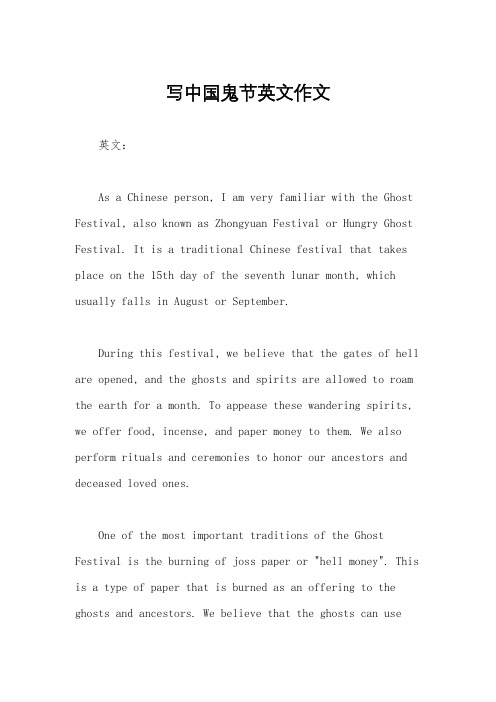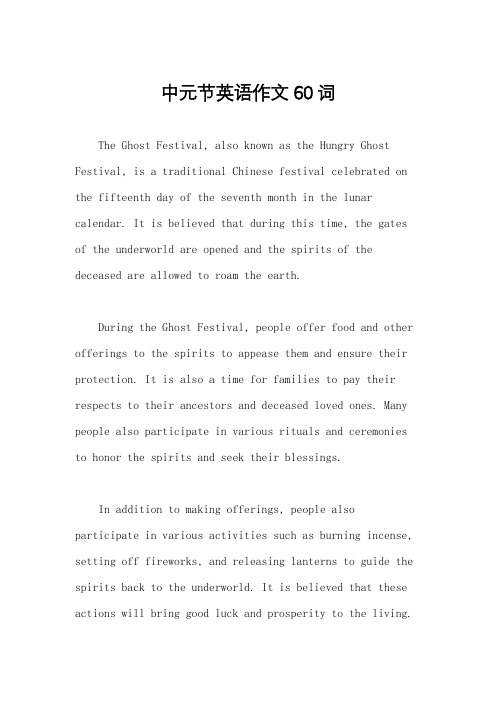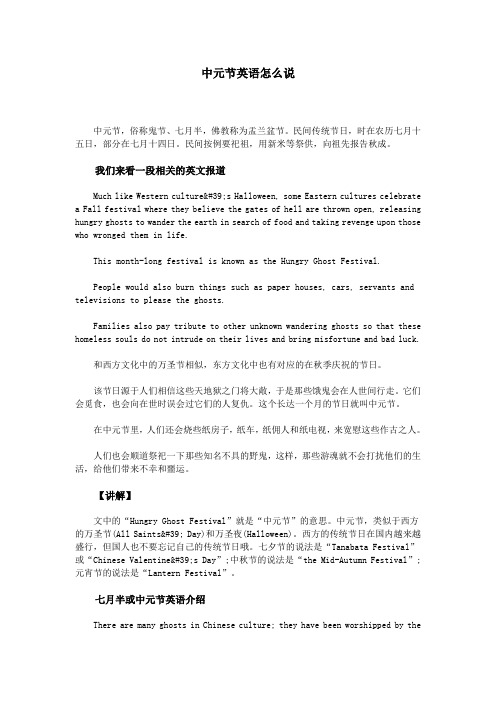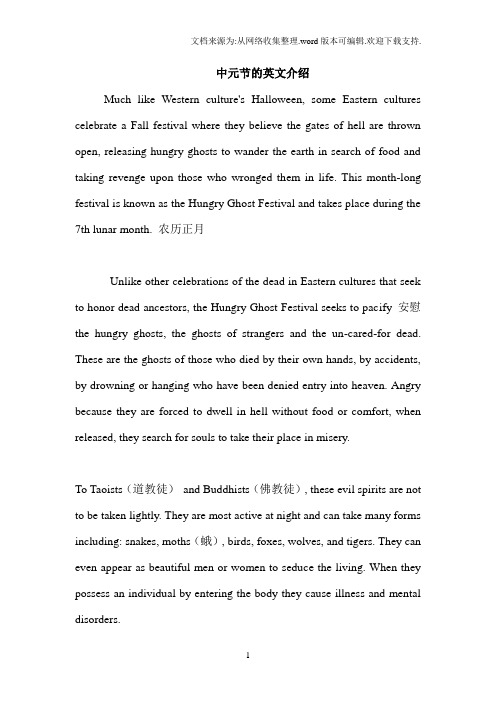中国四大鬼节之一 七月半或中元节英语介绍
写中国鬼节英文作文

写中国鬼节英文作文英文:As a Chinese person, I am very familiar with the Ghost Festival, also known as Zhongyuan Festival or Hungry Ghost Festival. It is a traditional Chinese festival that takes place on the 15th day of the seventh lunar month, which usually falls in August or September.During this festival, we believe that the gates of hell are opened, and the ghosts and spirits are allowed to roam the earth for a month. To appease these wandering spirits, we offer food, incense, and paper money to them. We also perform rituals and ceremonies to honor our ancestors and deceased loved ones.One of the most important traditions of the Ghost Festival is the burning of joss paper or "hell money". This is a type of paper that is burned as an offering to the ghosts and ancestors. We believe that the ghosts can usethis money in the afterlife, and it will bring them good luck and prosperity.Another tradition is the performance of Chinese opera or "ghost plays". These plays are performed on makeshift stages in the streets and parks, and they tell stories of ghosts and spirits. It is believed that these performances can entertain and appease the wandering spirits.中文:作为一个中国人,我非常熟悉鬼节,也被称为中元节或者盂兰盆节。
中元节英语作文120

中元节英语作文120Title: The Hungry Ghost Festival: A Cultural Insight。
The Hungry Ghost Festival, also known as Zhongyuan Festival, is a traditional Chinese festival celebrated on the fifteenth day of the seventh lunar month. It holds significant cultural and religious importance in Chinese communities worldwide. This festival is an intriguing blend of Buddhist and Taoist beliefs, steeped in rich traditions that have been passed down through generations.During the Hungry Ghost Festival, it is believed that the gates of the underworld are opened, allowing spirits and ghosts to roam freely on Earth. These spirits include deceased ancestors as well as wandering souls who have no living relatives to pay homage to them. To appease these restless spirits and ward off misfortune, various rituals and customs are observed.One of the most common customs during the Hungry GhostFestival is the offering of food and incense to the spirits. Families set up elaborate altars in their homes or at makeshift shrines in public spaces, adorned with fruits, desserts, and other delicacies. Incense sticks are lit to guide the spirits to the offerings and to create a fragrant atmosphere. It is believed that by providing these offerings, the living can gain the favor of the spirits and receive blessings in return.Another significant aspect of the Hungry Ghost Festival is the performance of traditional Chinese operas and puppet shows. These performances, known as "Yueju" or "Gezaixi," are staged in open-air theaters or temples throughout the month. The purpose of these shows is not only to entertain the living but also to entertain and appease the wandering spirits. It is believed that by enjoying these performances, the spirits will feel content and less likely to cause mischief among the living.Furthermore, the Hungry Ghost Festival is marked by the burning of joss paper, also known as "ghost money." Joss paper comes in various forms, including fake currency,houses, cars, and other worldly possessions. These items are burned as offerings to the deceased, symbolizing wealth and comfort in the afterlife. It is believed that the smoke from the burning joss paper carries these offerings to the spirit world, where they can be enjoyed by the departed.In addition to these customs, the Hungry Ghost Festival also includes the practice of releasing lanterns and floating candles on bodies of water. This act symbolizes guiding lost souls to the afterlife and represents the hope for a better future for both the living and the dead.Overall, the Hungry Ghost Festival is a time for reflection, remembrance, and reverence for the departed. It is a testament to the rich cultural heritage of the Chinese people and serves as a reminder of the importance of honoring one's ancestors and maintaining spiritual connections. Through its rituals and traditions, the Hungry Ghost Festival continues to be celebrated with great fervor and reverence by Chinese communities around the world.。
中元节英语作文60词

中元节英语作文60词The Ghost Festival, also known as the Hungry Ghost Festival, is a traditional Chinese festival celebrated on the fifteenth day of the seventh month in the lunar calendar. It is believed that during this time, the gates of the underworld are opened and the spirits of the deceased are allowed to roam the earth.During the Ghost Festival, people offer food and other offerings to the spirits to appease them and ensure their protection. It is also a time for families to pay their respects to their ancestors and deceased loved ones. Many people also participate in various rituals and ceremonies to honor the spirits and seek their blessings.In addition to making offerings, people also participate in various activities such as burning incense, setting off fireworks, and releasing lanterns to guide the spirits back to the underworld. It is believed that these actions will bring good luck and prosperity to the living.Overall, the Ghost Festival is a time for reflection, remembrance, and honoring the spirits of the deceased. It is a solemn and important occasion in Chinese culture that is celebrated with reverence and respect.。
中元节英语怎么说

中元节英语怎么说中元节,俗称鬼节、七月半,佛教称为盂兰盆节。
民间传统节日,时在农历七月十五日,部分在七月十四日。
民间按例要祀祖,用新米等祭供,向祖先报告秋成。
我们来看一段相关的英文报道Much like Western culture's Halloween, some Eastern cultures celebrate a Fall festival where they believe the gates of hell are thrown open, releasing hungry ghosts to wander the earth in search of food and taking revenge upon those who wronged them in life.This month-long festival is known as the Hungry Ghost Festival.People would also burn things such as paper houses, cars, servants and televisions to please the ghosts.Families also pay tribute to other unknown wandering ghosts so that these homeless souls do not intrude on their lives and bring misfortune and bad luck.和西方文化中的万圣节相似,东方文化中也有对应的在秋季庆祝的节日。
该节日源于人们相信这些天地狱之门将大敞,于是那些饿鬼会在人世间行走。
它们会觅食,也会向在世时误会过它们的人复仇。
这个长达一个月的节日就叫中元节。
在中元节里,人们还会烧些纸房子,纸车,纸佣人和纸电视,来宽慰这些作古之人。
浅析如何用英文讲述中元节起源与习俗

浅析如何用英文讲述中元节起源与习俗今天是农历七月十五日,恰好是“中元节”,俗称鬼节,那你知道如何用英文讲述中元节的来源与习俗吗?中文大家肯定都知道,今天小编在此与大家分享如何用英文讲述中元节的来源与习俗,大家不妨来了解下中英对照吧。
【词汇】Hungry Ghost Festival 中元节(也叫“鬼节”)The Hungry Ghost Festival is celebrated on the 15th day of the seventh lunar month.中元节在农历七月十五日。
【中元节的起源】The origin of the Hungry Ghost Festival and the Ghost Month in China is uncertain. Cultures in Asia from India to Cambodia to Japan share similar beliefs about the month, and these traditions seem to date from before Buddha.中元节是否起源于中国并不确定。
关于该节日的文化在一些亚洲国家诸如印度、柬埔寨、日本都信奉着相似的信仰,似乎这些传统都起源于佛教。
According to Taoism, the gates of hell are opened on the first day of the seventh month, and hungry ghosts are released to find food or to take revenge on those who have behaved badly according to Taoist records.根据道教说法,农历七月的第一天地狱之门将打开,饥饿的鬼魂得以释放去寻找食物或报复那些道家记载的作恶多端的人。
【中元节习俗】Family members offer prayers to their deceased relatives, offer food and drink and burn hell bank notes and other forms of joss paper.家庭成员向已故的亲人祈祷,送上祝福,奉上食物和饮料,烧一些诸如冥币这样的纸钱给他们。
中元节(中国的鬼节)的英文介绍

中元节的英文介绍Much like Western culture's Halloween, some Eastern cultures celebrate a Fall festival where they believe the gates of hell are thrown open, releasing hungry ghosts to wander the earth in search of food and taking revenge upon those who wronged them in life. This month-long festival is known as the Hungry Ghost Festival and takes place during the 7th lunar month. 农历正月Unlike other celebrations of the dead in Eastern cultures that seek to honor dead ancestors, the Hungry Ghost Festival seeks to pacify 安慰the hungry ghosts, the ghosts of strangers and the un-cared-for dead. These are the ghosts of those who died by their own hands, by accidents, by drowning or hanging who have been denied entry into heaven. Angry because they are forced to dwell in hell without food or comfort, when released, they search for souls to take their place in misery.To Taoists(道教徒)and Buddhists(佛教徒), these evil spirits are not to be taken lightly. They are most active at night and can take many forms including: snakes, moths(蛾), birds, foxes, wolves, and tigers. They can even appear as beautiful men or women to seduce the living. When they possess an individual by entering the body they cause illness and mental disorders.Throughout this month, to keep the angry spirits amused, people stage street operas and other forms of public entertainment. In the past, people did not view the street operas as they were performed only for ghosts. Other rituals(典礼,仪式)are performed to help souls enter into heaven. Taoists do their best to avoid late nights away from these amusements and rituals to steer clear of the evil spirits. To appease these wandering spirits, Buddhists and Taoists burn bundles of joss sticks, paper hell money, food, and other offerings by the roadside. Communities along rivers or near the sea float lanterns in the shape of the lotus or carved from fruit or gourds in the water to guide them away from their homes. They follow the lanterns from the river bank or sea shore till they can no longer be seen. This is done to redeem the soul of those who died by drowning.The most important days of this month are the 14th and 15th, the days of the great feasts. On the 14th, a great feast would be held to honor family ancestors. Prayers and offerings would be made at family altars. On the following night, the 15th, they would feast for the hungry ghosts. Held outside under the full moon, these feasts feed the evil spirits so that they will leave the living alone and bribe(贿赂)the ancestors for luck with money and the harvest.农历的七月十五日是什么日子?In Chinese tradition, the fifteenth day of the seventh month in the lunar calendar is called Ghost Day and the sev enth month in general is regarded as the Ghost Month, in wh ich ghosts and spirits, including those of the deceased anc estors, come out from the lower realm。
双语:中国四大鬼节之一七月半或中元节英语介绍

双语:中国四大鬼节之一七月半或中元节英语介绍万圣节是西方的鬼节,那你知道中国的四大鬼节是那四个节日吗?今天介绍中国四大鬼节之一七月半,俗称鬼节,又称中元节或盂兰盆节。
民间有阳间过元宵节阴间过鬼节的传说,因此鬼节是阴间最大的节日。
你知道怎样向外国朋友介绍中国的鬼节吗?随小编一起来看看吧!There are many ghosts in Chinese culture; they have been worshipped by the Chinese for a few thousand years. Even Confucius said, "Respect ghosts and gods, but keep away from them."While many people believe in ghosts, there are others who don't. The Chinese people often say, "If you believe it, there will be, but if you don't, there will not."The ghost is a classical image in Chinese culture, i.e., the young woman whose face is covered by long black hair, who dies due to misfortune, then comes back for revenge.The word "ghost" for many Chinese conjures up similar images. Often the ghost is a beautiful young woman. The sudden switch from a beautiful girl to a frightening ghost is striking. The seemingly fragile, helpless and beautiful women turning into fearless killers is a favorite theme among Asian movie directors and storywriters.Chinese Ghost FestivalJust as the West features Halloween for ghosts and ghouls, the Chinese have a holiday to honor the departed spirits of the underworld -- the Chinese Ghost Festival. It is said that ghosts roam the world every year for one lunar month. In some areas of China, visitors can see small roadside fires, where believers burn paper money and other offerings to appease the restless spiritsthat have temporarily been released from Hades.The Chinese Ghost Festival is also called "Half July" (Lunar). It is a popular occasion celebrated throughout China on the 15th day of the seventh lunar month.Historically, families offer sacrifices of the newly harvested grain to departed ancestors on this day, which also coincides with the Buddhist Ullambana (Deliverance) Festival and the Taoist Chinese Ghost Festival. Since each of these traditions in some way honors the spirits of the departed, the seventh lunar month has come to be known as "Ghost Month" and is a time when the "Good Brethren" (ghosts from the underworld) come back to earth to feast on the victuals offered by the living. Over time the Ullambana Festival and Ghost Festival have melded together to become the present-day Chung Yuan Putu or "Mid-origin Passage to Universal Salvation."The Chinese believe that the dead become ghosts between heaven and earth. Spirits without descendants to care for them are summoned during the Ghost Festival so that they may also enjoy the warmth of life among the living. This custom -- an extension of the traditional Chinese ethic of "universal love" -- has been woven together with the didactic legend, "Moginlin Saving His Mother From Hades." It lends the Ghost Festival a positive spin as a time for remembering the importance of filial piety. People now have inherited releasing river light as an important activity. It is said that river light can comfort and warm homeless ghosts.Burial of the deadIn the past, the burial of the dead (cremation is traditionally uncommon) was a matter taken very seriously in Chinese society. Improper funeral arrangements could wreak ill fortune anddisaster upon the family of the deceased.To a certain degree, Chinese funeral rites and burial customs were determined by the age of the deceased, the manner of his/her death, his/her status and position in society and his/her marital status.According to Chinese custom, an older person should not show respect to someone younger. Thus, if the deceased was a young bachelor his body could not be brought home but was left at the funeral parlor and the parents could not offer prayers for their son. Since the deceased was unmarried he had no children to perform the rites, which was why the body did not enter the family home. If a baby or child died no funeral rites were performed since respect could not be shown to a younger person. The child was, therefore, buried in silence.Chinese funeral rites for an elderly person must follow the prescribed form and convey the relevant rites that befit the person.Chinese thoughts towards life after deathYoung women in traditional societies are rarely endowed with much power, and malignant powers are only summoned with keen hatred and a desire for revenge. The more badly one is wronged, the more powerful he or she becomes after death.Such beliefs are closely related to the Chinese attitude towards life after death -- a combination of superstition and religion.Buddhist doctrines about the life cycle led to many vivid descriptions in Chinese legends about karma. For example, Buddhism forbids murder; in folklore, people believe that butchers return in the next life in the form of the animals they killed. People who treat others badly or do cruel things becomepathetic beings, suffering for the rest of the next life.Besides retribution in lives to come, vivid and complicated descriptions of heaven and hell also exist in Chinese legends.People have imaginatively transfigured their real life experiences into visions of the unknown world. The Chinese legendary hell, for example, is governed by a king in a completely bureaucratic system.The king of the underground takes charge of people's lives, keeping a book that spells out the exact time of everybody's death.In the classic novel, Pilgrimage to the West, the Monkey King Wu Kong goes to visit the king of hell and reads the book of death. He looks for his own name and erases it, ensuring himself everlasting life.。
中元节英文介绍

中元节英文介绍The Mid-Autumn Festival, also known as Zhongqiu Festival in Chinese, is a traditional Chinese festival that is held on the 15th day of the 8th lunar month, which usually falls in September or early October. It is a time for family reunions and the celebration of harvest.The festival has a long history, dating back more than 3,000 years. It was originally a harvest festival, where people would give thanks for the good harvest and pray for a better future. The festival is also closely associated with the moon and its worship. The full moon during the Mid-Autumn Festival is considered to be the brightest and roundest of the year, symbolizing unity and completeness.One of the most important traditions of the Mid-Autumn Festival is the eating of mooncakes. Mooncakes are round pastries filled with various sweet or savory fillings, such as lotus seed paste, red bean paste, or egg yolk. They are usually enjoyed with a cup of tea or a glass of wine. In addition to mooncakes, people also enjoy fruits, nuts, and other traditional delicacies during the festival.Another popular activity during the Mid-Autumn Festival is lantern making and lantern parades. Children and adults alike enjoy making and decorating lanterns in various shapes and sizes. These lanterns are then displayed and paraded in the streets at night, creating a colorful and festive atmosphere.During the festival, families and friends also gather to appreciate the moon. They sit outside, often on rooftops or in gardens, andadmire the beauty of the moon while enjoying mooncakes and tea. In some regions, there are even special performances, such as traditional dragon and lion dances, to entertain the crowds.The Mid-Autumn Festival is not only celebrated in China, but also in other East Asian countries such as Vietnam, Korea, and Singapore. Each country has its own unique customs and traditions, but the essence of the festival remains the same - to celebrate the harvest, give thanks, and enjoy the company of loved ones.In recent years, the Mid-Autumn Festival has gained popularity worldwide. It has become a time for cultural exchange and celebration, with people from different cultures and backgrounds coming together to experience and share the joy of this ancient festival.In conclusion, the Mid-Autumn Festival is a time for family reunions, the celebration of harvest, and the worship of the moon. It is a festive occasion filled with delicious food, colorful lanterns, and the company of loved ones. Whether you are in China or anywhere else in the world, the Mid-Autumn Festival is a time to come together and appreciate the beauty of nature and the blessings of life.。
- 1、下载文档前请自行甄别文档内容的完整性,平台不提供额外的编辑、内容补充、找答案等附加服务。
- 2、"仅部分预览"的文档,不可在线预览部分如存在完整性等问题,可反馈申请退款(可完整预览的文档不适用该条件!)。
- 3、如文档侵犯您的权益,请联系客服反馈,我们会尽快为您处理(人工客服工作时间:9:00-18:30)。
中国四大鬼节之一七月半或中元节英语介绍万圣节是西方的鬼节,那你知道中国的四大鬼节是那四个节日吗?今天介绍中国四大鬼节之一七月半,俗称鬼节,又称中元节或盂兰盆节。
民间有阳间过元宵节阴间过鬼节的传说,因此鬼节是阴间最大的节日。
你知道怎样向外国朋友介绍中国的鬼节吗?随小编一起来看看吧!There are many ghosts in Chinese culture; they have been worshipped by the Chinese for a few thousand years. Even Confucius said, "Respect ghosts and gods, but keep away from them."While many people believe in ghosts, there are others who don't. The Chinese people often say, "If you believe it, there will be, but if you don't, there will not."The ghost is a classical image in Chinese culture, i.e., the young woman whose face is covered by long black hair, who dies due to misfortune, then comes back for revenge.The word "ghost" for many Chinese conjures up similar images. Often the ghost is a beautiful young woman. The sudden switch from a beautiful girl to a frightening ghost is striking. The seemingly fragile, helpless and beautiful women turning into fearless killers is a favorite theme among Asian movie directors and storywriters.Chinese Ghost FestivalJust as the West features Halloween for ghosts and ghouls, the Chinese have a holiday to honor the departed spirits of the underworld -- the Chinese Ghost Festival. It is said that ghosts roam the world every year for one lunar month. In some areas of China, visitors can see small roadside fires, where believers burn paper money and other offerings to appease the restless spirits that have temporarily been released from Hades.The Chinese Ghost Festival is also called "Half July" (Lunar). It is a popular occasion celebrated throughout China on the 15th day of the seventh lunar month.Historically, families offer sacrifices of the newly harvested grain to departed ancestors on this day, which also coincides with the Buddhist Ullambana (Deliverance) Festival and the Taoist Chinese Ghost Festival. Since each of these traditions in some way honors the spirits of thedeparted, the seventh lunar month has come to be known as "Ghost Month" and is a time when the "Good Brethren" (ghosts from the underworld) come back to earth to feast on the victuals offered by the living. Over time the Ullambana Festival and Ghost Festival have melded together to become the present-day Chung Yuan Putu or "Mid-origin Passage to Universal Salvation."The Chinese believe that the dead become ghosts between heaven and earth. Spirits without descendants to care for them are summoned during the Ghost Festival so that they may also enjoy the warmth of life among the living. This custom -- an extension of the traditional Chinese ethic of "universal love" -- has been woven together with the didactic legend, "Moginlin Saving His Mother From Hades." It lends the Ghost Festival a positive spin as a time for remembering the importance of filial piety. People now have inherited releasing river light as an important activity. It is said that river light can comfort and warm homeless ghosts.Burial of the deadIn the past, the burial of the dead (cremation is traditionally uncommon) was a matter taken very seriously in Chinese society. Improper funeral arrangements could wreak ill fortune and disaster upon the family of the deceased.To a certain degree, Chinese funeral rites and burial customs were determined by the age of the deceased, the manner of his/her death, his/her status and position in society and his/her marital status.According to Chinese custom, an older person should not show respect to someone younger. Thus, if the deceased was a young bachelor his body could not be brought home but was left at the funeral parlor and the parents could not offer prayers for their son. Since the deceased was unmarried he had no children to perform the rites, which was why the body did not enter the family home. If a baby or child died no funeral rites were performed since respect could not be shown to a younger person. The child was, therefore, buried in silence.Chinese funeral rites for an elderly person must follow the prescribed form and convey the relevant rites that befit the person.Chinese thoughts towards life after deathYoung women in traditional societies are rarely endowed with much power, and malignant powers are only summoned with keen hatred and a desire for revenge. The more badly one is wronged, the more powerful he or she becomes after death.Such beliefs are closely related to the Chinese attitude towards life after death -- a combination of superstition and religion.Buddhist doctrines about the life cycle led to many vivid descriptions in Chinese legends about karma. For example, Buddhism forbids murder; in folklore, people believe that butchers return in the next life in the form of the animals they killed. People who treat others badly or do cruel things become pathetic beings, suffering for the rest of the next life.Besides retribution in lives to come, vivid and complicated descriptions of heaven and hell also exist in Chinese legends.People have imaginatively transfigured their real life experiences into visions of the unknown world. The Chinese legendary hell, for example, is governed by a king in a completely bureaucratic system.The king of the underground takes charge of people's lives, keeping a book that spells out the exact time of everybody's death.In the classic novel, Pilgrimage to the West, the Monkey King Wu Kong goes to visit the king of hell and reads the book of death. He looks for his own name and erases it, ensuring himself everlasting life.。
